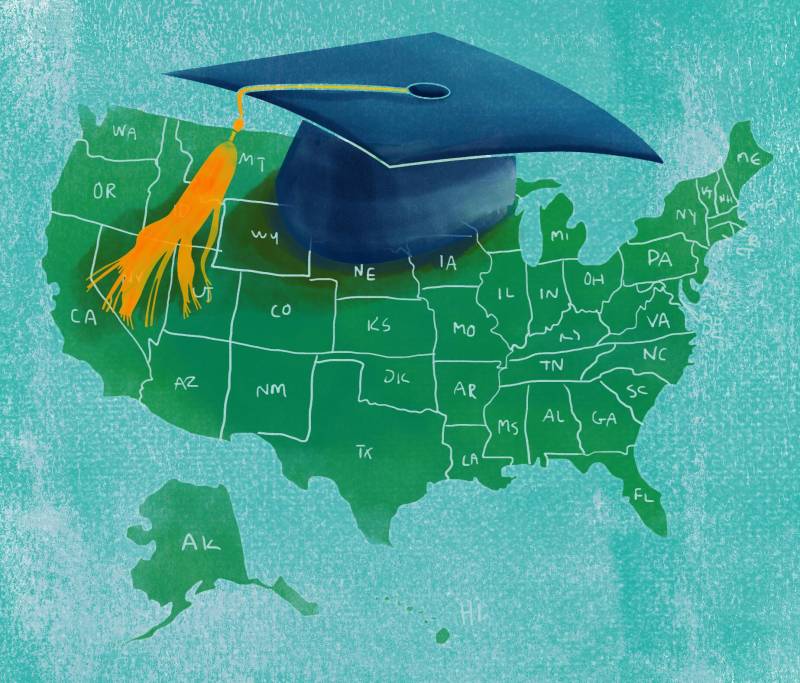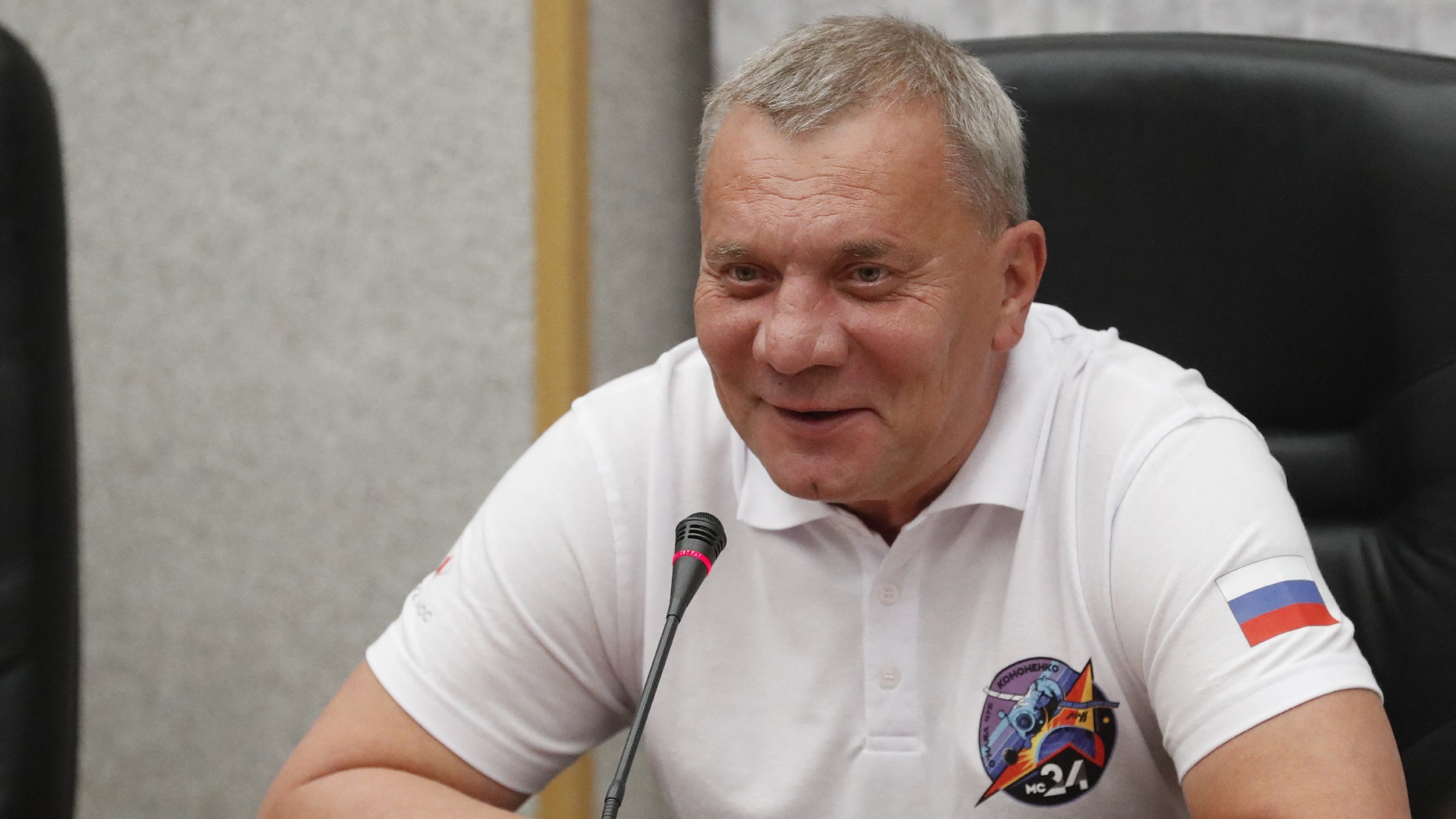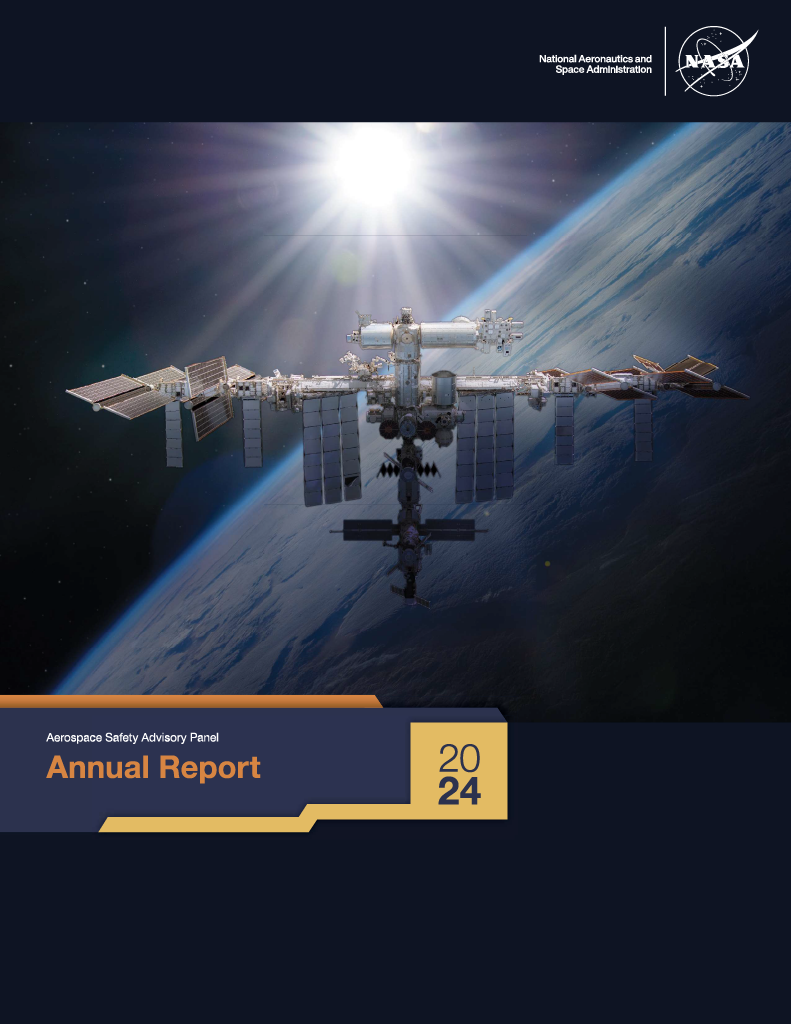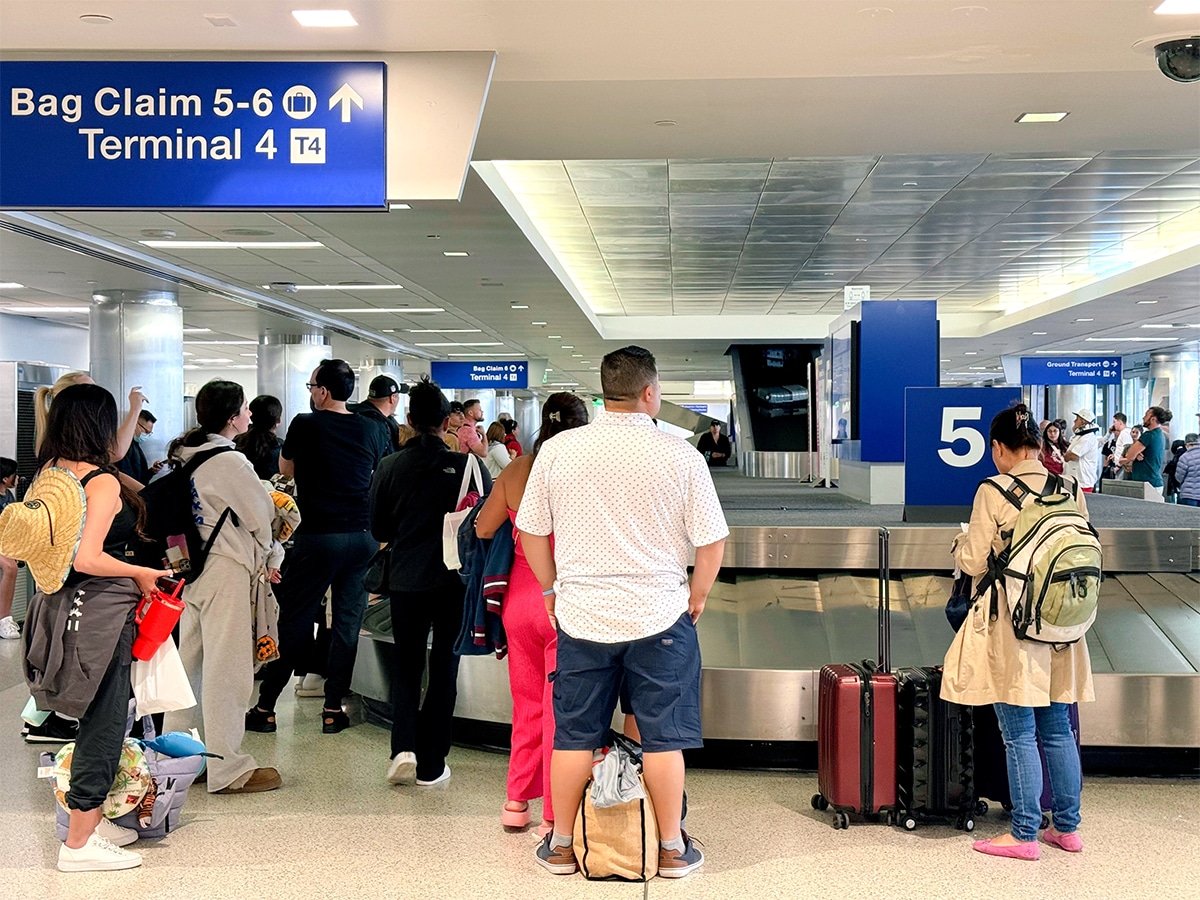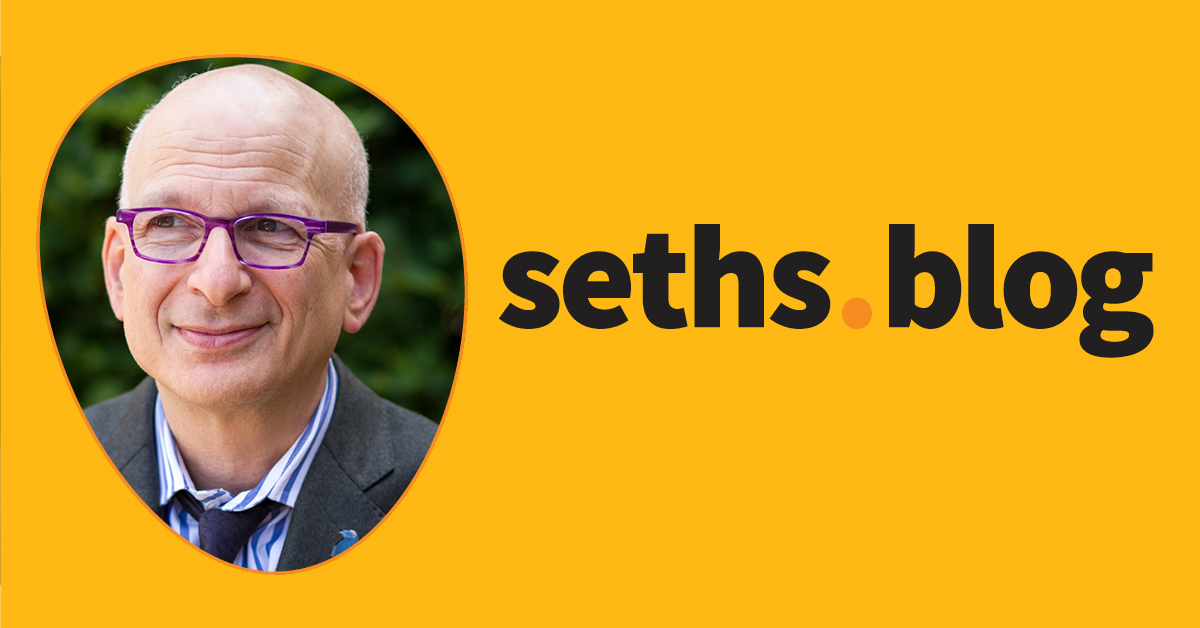Pay Attention to the FBI
That’s a whole other crisis brewing.

Subscribe here: Apple Podcasts | Spotify | YouTube | Overcast | Pocket Casts
Sometime on Tuesday evening, the USAID website was taken down and replaced with what looked like a beta page from the internet of the 1990s. There were no affecting photos of American government officials distributing food and medicine overseas. Instead, a box of text explained that nearly all USAID personnel would be placed on administrative leave, globally. With administrative assistance from Elon Musk, President Donald Trump seems to have wiped out the world’s largest donor agency in just a few days. It was a radical act, but maybe not as politically risky, in the domestic sense, as other plans in the grand project of dismantling the federal government. USAID has important beneficiaries, but most of them are not Americans and live overseas.
In this episode of Radio Atlantic, we discuss where Trump and Musk seem to be headed and the obstacles they are likely to encounter in the future. What happens when Trump starts to face challenges from courts? What happens when Musk goes after programs that Americans depend on, particularly those who voted for Trump? What new political alliances might emerge from the wreckage? We talk with staff writer Jonathan Chait, who covers politics. And we also talk with Shane Harris, who covers national security, about Trump’s campaign to purge the FBI of agents who worked on cases related to the insurrection at the Capitol.
“I think that will send a clear message to FBI personnel that there are whole categories of people and therefore potential criminal activity that they should not touch, because it gets into the president, his influence, his circle of friends,” Harris says. “I think that is just a potentially ruinous development for the rule of law in the United States.”
The following is a transcript of the episode:
Hanna Rosin: Today is the deadline for some two million federal employees to decide if they want to type resign in response to the now infamous “Fork in the Road” email. The email, of course, is one in a list of things that Elon Musk, empowered by President Trump, has been doing in order to “disrupt” the federal government.
Donald Trump: We’re trying to shrink government. And he can probably shrink it as well as anybody else, if not better.
Rosin: For example: gain access to the U.S. Treasury’s payment system—
News anchor: Treasury Secretary Scott Bessent reportedly granting Elon Musk’s DOGE team access to the federal government’s payment system, which handles trillions of dollars in payments.
Rosin: —dismantle USAID, of which Trump is not a fan—
Trump: And we’re getting them out. USAID—run by radical lunatics.
Rosin: —and neither is Musk.
Elon Musk: If you’ve got an apple, and it’s got a worm in it, maybe you can take the worm out. But if you’ve got actually just a ball of worms, it’s hopeless. And USAID is a ball of worms. There is no apple. And when there is no apple, you’ve just got to basically get rid of the whole thing.
Rosin: All of these efforts are unusual, maybe even unprecedented, norm-breaking—even for Trump. But are they unconstitutional? And could they fundamentally change the character of the country?
This is Radio Atlantic. I’m Hanna Rosin.
[Music]
News anchor: At the FBI, some agents have started to pack up their desks as fears of mass firings grow.
Rosin: In the second half of the show, we’re going to focus on a special case inside the government, which presents a different set of potentially history-changing problems—the FBI—with staff writer Shane Harris.
But first, we are going to discuss what’s at stake, more broadly in this overhaul, with staff writer Jonathan Chait, who covers politics for The Atlantic.
[Music]
Rosin: Jon, welcome to the show.
Jonathan Chait: Thank you, Hanna. I’m delighted to be here.
Rosin: So, Jon, of all the unorthodox things that Trump has authorized Elon Musk to do with the federal government, which one strikes you as pushing constitutional limits the most?
Chait: Attempting to eliminate or cut spending for agencies that have been authorized by Congress. This is just a totally revolutionary step in terms of the structure of our government. And it’s kind of shocking, to me, how far he’s been able to go, and how much permission he’s received from the Republican Party.
Rosin: And is there another time in history when a president tested this limit between what Congress authorizes and what the president can do with that? And how has it worked out in the past?
Chait: That’s a great question. You had a struggle with Andrew Jackson over the Bank of the United States. That was a real constitutional struggle between him and his enemies as to how much power the president had vis-à-vis Congress and whether the president had just total authority to do what he wished. And Andrew Jackson was sort of known for pushing the boundaries of the office to or past their limits, and saying if the Supreme Court ruled against him, he would just do what he wanted, anyway. He did the same thing with his attempts to ethnically cleanse Native Americans to take their land. He just fundamentally didn’t care if he had authority from Congress.
That’s the kind of struggle we’re, I think, heading into right now. And Richard Nixon tried a smaller version, I think, of what Trump is doing now. He basically said, Congress has authorized certain kinds of spending, and I’m just going to impound it. But the Supreme Court ruled against him, and Congress passed the Impoundment [Control] Act that formalized the fact that Congress has this authority, and the president doesn’t, and if Congress authorizes spending, with very limited exceptions, the president has to carry it out. And if the president objects to certain forms of spending that Congress enacted, he has to persuade Congress to pass a law to change it.
Rosin: Got it. Okay. So that’s the line we’re working with. So it’s the Impoundment Act. It’s been defined by the Supreme Court. Can we talk about examples of, say, how far an administration can go in resisting a previous administration’s policies, but not pushing against this constitutional line? What would be something we’ve seen before? And what would prompt what people would refer to as, say, a legal or constitutional crisis?
Chait: Just in the big picture, the executive branch has been asserting more and more authority, over decades, as Congress has gotten more and more dysfunctional. The use of the filibuster has risen. Congress has gotten less and less able to fulfill its constitutional obligation to really direct national policy the way the Constitution imagined it. And so the executive branch has really kind of filled in this gap in a lot of ways. So you’ve seen presidents of both parties creatively exerting their authority.
You had Trump doing this with immigration, where he, you could say, couldn’t or just barely even tried to get Congress to fund the wall that he wanted. So he just basically redirected funding from the Pentagon to the border by calling it an emergency. And Trump is doing the same thing with tariffs.
Now, Congress basically ceded the president emergency authority to declare tariffs for various national-security emergencies, thinking that this would just be used in the case of something like a war or an international conflict, but it let the president decide what an emergency is. And so Trump can just say, well, an emergency is whatever he wants, and that’s on Congress.
And Biden has kind of pushed the limit in a lot of ways, I think most controversially with student loan forgiveness, where the executive branch has control over student loans, and so Biden just kind of forgave those loans on a kind of sweeping basis. Now, he was challenged legally. But when you’re in power, your party has a pretty strong incentive to interpret executive power in the most sweeping way.
So there’s a way in which both parties have really been engaged in this, but I really think what Trump and Musk are doing now has totally breached the walls of normal and is just turning the Constitution into a farce.
Rosin: Okay. So the reason that’s true is mostly because of appropriations? Because from what you’ve said, presidents are pushing this line constantly. So what are they doing that doesn’t just break norms or traditions, but actually is pushing into constitutional crisis?
Chait: Article I of the Constitution, which is really just, like, the guts of the Constitution, says that Congress has authority over spending.
So Congress establishes an agency. Congress sets its spending levels. And throughout our history, with the exception we’ve described for Nixon, which was slapped down, the presidents have to follow that because that’s the law, right? Now, the president has a role in that. The president can veto some of these laws. If Congress proposes spending that the president doesn’t want, the president can veto it, and then Congress can override it, or Congress can make a deal with him. But whatever emerges from that is the law, and the president has to follow the law.
Rosin: Okay. And does the Trump team have any creative arguments for how to get around this Impoundment Act?
Chait: So far, Elon Musk is just operating in this totally chaotic legal gray zone. So his first target has been the United States Agency for International Development. And one thing they’ve made this argument is that, Well, that was just established by an executive order by the president, John F. Kennedy, 1961, so it can be ended by an executive order. The problem is: After it was established by executive rule, it was later established by Congress. Congress voted to make the United States Agency for International Development an agency.
So after Congress established the United States Agency for International Development, it had the force of law. And so saying, We’re going to eliminate this agency, is just a violation of the law. It’s pretty simple.
Rosin: Okay. I can see the argument. So can we play out both scenarios? The first scenario is: The courts push back on Trump. You know, they enforce the Impoundment Act. They say, You cannot do this. You can’t end USAID. Elon Musk has to stop roaming around the federal government and making these decisions that violate this constitutional balance of power. What happens then? Does it call Trump’s bluff?
Chait: It might, but I wouldn’t count on it, for a couple reasons. Number one: Musk is moving much faster than the legal system can move. And it’s a lot easier to destroy something than it is to build something. So once you’ve basically told everyone they’re fired, and they can’t come to work, they can sit and wait for the courts to countermand that while they’re losing their income and their mortgage is going under, or they could just go find another job somewhere.
Rosin: I see. So it’s just, like, facts on the ground change, so that even if the legal reality doesn’t budge, you’ve already disintegrated the actual infrastructure.
Chait: You lose the institutional culture. You lose the accumulated expertise. And by the time the courts have stepped in, rebuilding it is difficult to do, even if the president wanted to. And obviously, they’re not going to want to anyway. Second of all, it’s not totally clear that they’re going to follow the law, that the law has any power over them.
I mean, remember: Donald Trump established on the first day of his administration that he believes that people who break the law on his behalf can get away with it when he pardoned the entire—or commuted the sentences of the entire—insurrectionists, right?
Rosin: Yeah.
Chait: So Elon Musk knows full well that if he violates the law, Trump is going to have his back. So I think that’s also shaping the behavior of everyone involved in this episode.
Rosin: Right. So it sounds like you pretty strongly believe there is no brake to this. b-r-a-k-e. There is no stop to this. I was thinking that maybe the courts or something to, you know, put some hope in to stop this. But it sounds like no.
Chait: Well, in the long run, the courts can have an effect by saying, You don’t have the authority to eliminate this agency. It still exists, meaning that when the Democrats win back the presidency, if that ever happens, it’ll still be there, and then they can actually rebuild it.
Rosin: So in other words, in that scenario, there’s temporary dismantling, but the balance of powers remains in place, is affirmed by the courts, and things get slowly rebuilt.
Chait: Right. Although, you know, you’ve lost all your talent, you’ve lost your institutional memory, and then you’re probably rebuilding this agency from scratch.
And keep in mind, USAID is just the test case. I think they’re just picking on the most politically vulnerable agency. It deals with foreign aid, right? So most of the people affected by this right now are mostly living in other countries, who won’t get, you know, drinking water and food. And people are going to starve and die of diseases, but they’re not going to be Americans. They can’t vote, so they’re politically weak and vulnerable.
So that’s the target that they’ve picked to establish this principle that the presidency can pick and choose what spending is real and what isn’t. So then they’re going to start to go on to do domestic targets. But then, I think, once they’ve started attacking domestic targets, then they’re going to start dealing with political blowback in a way they’re not facing when they’re going after foreign aid.
Rosin: I see. So that’s a different political—so if that starts to happen, if we enter a period where you have people who have stake in this in the U.S., can you see any interesting alliances that could come out of that moment?
Chait: It’s really hard to see where they’re going, because Elon Musk is not proceeding from an accurate map of reality.
So to just explain what I mean by that, he said that he wants to cut—first he said—$2 trillion from the fiscal-year budget, from one year. Then he revised it down to $1 trillion. So right away, you know, when you’re just picking these random round numbers, you obviously don’t know what you’re talking about. But he said, like, basically, there’s a trillion dollars in just, you know, waste and improper payments—and there just isn’t. There’s nothing close to that by even the most expansive possible definition. So Musk thinks he’s going to just go through the budget and find waste, and just kill it and add up to a trillion dollars. And he’s obviously not.
So the question is: What happens when his fantasy starts to run into reality? Does he start to just attack social-welfare programs and end payments of food stamps and Medicaid reimbursements and programs like that to people? Does he realize that he didn’t know what he was talking about and he’s in way over his head? We don’t know how it’s going to go, but I think that is the question you’ve got to answer before you start to figure out what the politics look like.
Rosin: Right. And there’s also military budgets. Like, if you think where the giant spending is, you’re running up against budgets that will face a huge amount of resistance if you slash them in the way that he’s slashed other things.
Chait: Right. Yeah. If they start going after the Pentagon, I think you, obviously, cut pretty deeply into the Republican coalition pretty fast. I even think they’re probably starting to accumulate small amounts of domestic political targets with USAID, right? They cut off funding to a Lutheran charity, but, you know, those are midwestern religious conservatives who are operating those programs who are being targeted. Now, most of the money is going overseas, but you’re still hurting people in the United States of America. And I think that pain is going to start to spread more widely if they keep going.
Rosin: Right. Okay, so you’re describing a realistic scenario in which this whole operation does encounter resistance. There are many policy researchers—on the left, even—who have argued that the government does, in fact, need an overhaul and, more specifically, isn’t equipped for a digital age. Is there a chance that in all of this, you know, Elon Musk could usher in a more efficient, tech-friendly kind of government?
Chait: Yeah, well, that was the initial hope that some people who specialize in government reform were hoping for. Jennifer Pahlka is an expert in what’s called “state capacity,” which is just the ability of government to function and to bridge the gap between its ambitions and its actual ability to meet those ambitions.
And part of that is fixing the way government hires and fires people.
But the problem is: Elon Musk doesn’t seem to be interested in that in any way whatsoever. He’s just holed up with a bunch of engineers who don’t seem to have any expertise in government or state capacity whatsoever. And they’re just finding programs that people within this kind of right-wing bubble in which he resides think sound radical and just, you know, saying, Delete it! Delete it! and getting cheers on social media for it.
It’s just so completely haphazard. There doesn’t seem to be any interest in actually making the government, you know, operate better.
Rosin: Yeah. And I suppose Twitter did not become a better, more profitable, you know, smoother-functioning company after Elon Musk took it over. It just became a kind of tool of the culture war—like, an effective tool of the culture war.
Chait: Right. It became smaller, less profitable—jankier, but more conservative.
Rosin: Right, okay. All right. One final thing. So project far into the future. Let’s say that your blowback scenario is real. What political alliances can you see reforming? Like, if you had to predict a political realignment some years down the road that includes a reaction to everything that’s going on now, what does it look like?
Chait: Well, the Trump coalition has really been built on winning multiracial, working-class voters back from the Democrats—and those voters are disproportionately to the right on social policy—and they’ve exploited some of those progressive stances on social policy that the Democratic Party has adopted over the last decade, but they’re still relatively to the left on economics. Maybe they don’t believe in government, in the abstract, but in the specific, they really rely on programs, like nutritional aid and Medicaid, Obamacare.
And every time the Republicans have gone after those programs, their coalition has splintered. That was really a major element in killing George W. Bush during his second term. He decided to privatize social security, and that was a major cause of the decline of his popularity that made him politically toxic, along with the Iraq War and Katrina, social security privatization.
You know, you could see a version of that happening with Trump, but I wouldn’t take for granted that it’ll play out that way because we live in a different world in a lot of ways.
[Music]
Rosin: Thanks again to Jonathan Chait.
After the break: Donald Trump also has his eyes set on the FBI. We hear from The Atlantic’s Shane Harris about what that might mean.
[Break]
Rosin: Shane, welcome to the show.
Shane Harris: Hi. Thanks for having me.
Rosin: Sure. So the president asked the FBI to turn over the names of every agent who worked on the Capitol riots. What do you read into that request?
Harris: Well, I think you don’t even have to read that closely between the lines. You can just read the lines as they were sent in the order that we now have seen publicly, that went from the acting deputy attorney general, Emil Bove, of course, who had been one of Donald Trump’s lawyers as a private citizen, telling the acting director for the FBI, Look—we want the names of these people because they believe in the words that he has put, that they can no longer have trust that these FBI employees will implement the president’s agenda faithfully.
So what they are saying is that these are individuals who they don’t think are on board with Trump administration policies. And then of course, you know, we can do a little bit of inference, which is, you know, why would he go after the people who investigated January 6 and his role in it? Which was, by the way, the biggest FBI investigation in the country’s history. You know, these are the agents who interviewed and ultimately gave evidence that created the charges for the Capitol rioters—who were sent to prison, who Trump then later pardoned and who are now free—who investigated his own activity around January 6 and efforts to impede the transition from the Trump to the Biden administration.
So these are the FBI agents who did that case. And you know, what Trump is making very clear here is that, you know, he wants to identify them. He doesn’t trust them. He doesn’t trust the leadership that oversees them, and either wants them removed or moved, or we’ll see what the disciplinary action is. But some of them, he’s actually said he wants them fired immediately. He’s made pretty clear how he feels about these people and why he’s going after them, I think.
Rosin: Now, that must have landed in a very particular way at the FBI. You know the agency better than I do. As far as I understand it, I mean, you are assigned a case; you work on that case. So how have leaders in the agency responded to that request?
Harris: I think it’s been really interesting. I mean, there’s been this mixture from people I’ve talked to of: On one level, people are not surprised that Donald Trump went after FBI personnel, because it was expected that he would go after senior-leadership-level type people. I mean, he had essentially pushed out the FBI director, Christopher Wray, who—remember—became the FBI director when Donald Trump fired the previous FBI director, James Comey, in his first term.
But people were genuinely stunned by the scope of this demand to know the names of all of these agents who worked J6—and then there’s one other related case—because it’s, you know, potentially 4,000 to maybe even 6,000 personnel if you’re taking in FBI agents, analysts, people who play a support role.
But then something really fascinating has happened: There has been this—I hesitate to say the word defiant—but there are senior leaders at the FBI, including the person who is serving as the acting director right now, who essentially are saying, No, you cannot just fire agents for this reason, for no real cause. These people have protections under civil-service rules. They have due-process rights. And what’s more, some of the advocates for these folks are saying, Look—you can just read the plain language of the order that I just read to you and see that this is a retaliatory response, that what the president is doing is going after people because he doesn’t like their opinions or what they did.
As you pointed out, these thousands of agents didn’t pick to be on the case. I mean, it’s not like they raised their hand and said, Yes, please. I would like to investigate and prosecute Donald Trump. They were assigned these cases. So the leadership has actually really kind of dug in here, some of them, and essentially is saying, There’s a process for this. This isn’t fair.
Now, we’ll see how long they can resist the White House on this, but we’re seeing some real institutional pushback from the FBI, which personally, I think, is encouraging.
Rosin: I want to get more into the pushback, but I’m curious what we know about this group of agents. There’s a few thousand. Because, yes, I followed the January 6 cases. I know that it was the biggest investigation in history, but who are they? Like, if you think about losing these 4,000, is why I’m asking, what’s their expertise, and what do they generally do?
Harris: If we take that group of the J6 investigators, the agents themselves, these could be people who were pulled in from all over the country. So this could include agents that were investigating national-security-related matters, counterterrorism matters, transnational crime, narcotics. The universe of these agents, as you know, was so big because the case was so big and demanding.
Trump, though, has zeroed in, more particularly, on some individuals, including some very senior-level officials that have the title of executive assistant director, and he actually named some of these in this order. And those people were involved in things like, for instance, the Mar-a-Lago investigation, when Donald Trump took classified documents from the White House and stored them at his estate in Florida—offenses for which he was later charged under the Espionage Act.
Some of these people—one of them was the special agent in charge of the Miami Field Office, which participated in the raid on Mar-a-Lago. Others had supervisory and leadership positions on intelligence and counterintelligence matters. It was a counterintelligence squad at the Washington Field Office in D.C. that handled the Mar-a-Lago case. So, you know, he understands that there are people who, individually, separate from J6, worked on the Mar-a-Lago case, as well, and those people are being singled out too.
Rosin: Right. I mean, there are two things here. One is, we’ve talked about this in terms of other agencies, like USAID, which is: What vast institutional knowledge would you lose? So these people worked on individual cases, but also, they have a lot of expertise in counterterrorism. They just must have a large, you know, body of knowledge and experience that you could lose.
Harris: Absolutely. So let’s just take, for instance, the squad at the Washington Field Office that did the Mar-a-Lago investigation. They work in the counterintelligence division of the FBI. So when those folks are not investigating, you know, Donald Trump’s removal of classified documents, they’re looking at things like spies operating inside the United States trying to maybe steal government secrets or recruit agents in the United States. They’re looking at people who might be mishandling classified information. They look at people who might be leaking to journalists as well.
These are folks who work on highly specialized counterintelligence cases. This isn’t just something that you, you know, kind of step into, and on day one, you know how to do it. These are different kinds of tradecraft. They’re very sensitive. These people all will have high-level security clearances. They will have been vetted for these jobs. So folks who are in positions like that, when you eliminate them, you know, it’s not entirely clear to me that there is just then, like, a backup bench of people who can come in to do these really important national-security cases.
And the same would go for anyone who’s working actively on counterterrorism, you know. I mean, Donald Trump has talked a lot about his concern that there are, you know, terrorists making their way inside the United States, taking advantage of, you know, weak border security or other ways of getting into the U.S. Well, it’s FBI agents who do counterterrorism cases that investigate things like that.
So if you’re suddenly moving people with this level of expertise off their jobs, or you are creating a real disruption and distraction while they’re trying to do their jobs, I think that arguably weakens national security, it creates vulnerabilities, and it distracts the FBI from doing its job, which is to go out and not just investigate crimes but to try and stop violent crimes and bad things from happening to Americans and to the U.S. government.
Rosin: Right. So you can see the future crisis. Like, you can project a future crisis where we are vulnerable to terrorism or something like that because we’ve lost a huge amount of this expertise.
Harris: I think that’s right. Yes. It doesn’t seem to me like he is thinking through the consequences of hobbling the FBI at this moment. What he is interested in is retribution. He’s interested in payback. And he is putting, you know, not only the country, but he’s putting his administration at grave political risk by doing that.
Rosin: Okay, Shane. Here’s something else that I was wondering about. Since when did the FBI come under so much suspicion from the right? I’ve always thought of the FBI as an agency conservatives can get behind, and Trump’s attacks feel like they upend all that. It’s confusing.
Harris: Oh definitely. And this has long been one of the more baffling aspects of Donald Trump’s critique of the FBI, as he’s painting them as this kind of leftist deep state.
I mean, the FBI—I’m speaking in general terms, of course, I mean—it is a generally conservative institution, both because I think that the people who work in it are often politically conservative or just sort of dispositionally conservative. It’s a law-enforcement agency. I mean, it does everything by the book. There are jokes in the FBI about how it takes, you know, five forms that you have to fill out before you can make a move on anything. It is a very hidebound, bureaucratic, small-C conservative organization. I mean, these are cops.
Rosin: Right. Right.
Harris: Okay? It’s a bunch of cops, right? This is like, if you want to think in generalities, like, you know, USAID is like, Oh, yeah, it’s people who want to get to charities, and they worked in the Peace Corps, and they’re all about humanitarian causes. And that, too, is kind of a broad brush.
But, you know, when I talk to people who have worked in the bureau, if you knew these people, these are not people who you would associate with progressive causes. That doesn’t mean that they are sort of reactionary right-wingers. I don’t want to make that impression either. They’re very much following the rule of law. It’s a conservative institution. It is very hidebound and steeped in tradition and in regulation.
And, you know, Trump just has this image of it as this out-of-control left organization. And he has persuaded large numbers of his followers and Americans that this is true. And I have to tell you, in the 20-plus years that I’ve covered national security, one of the most fascinating and bewildering trends that I have seen is this change in political positioning, where now, people who tend to be on the left, sort of—I don’t want to say revere the FBI and the intelligence agencies but—hold them up as models of institutions of government that we need to have faith and trust in, and they’re there to try and protect people. When it was a generation ago, people on the left who were deeply skeptical of the CIA and the FBI because these agencies were involved in flagrant abuses of civil rights and of the law in the 1950s and ’60s.
And now it’s people on the right who, particularly after 9/11, used to be so reflexively defensive of the CIA and the FBI and counterterrorism and Homeland Security, who now have sort of swapped political positions with the critique on the left that see these institutions as, you know, run through with dangerous, rogue bureaucrats who want to prosecute their political enemies. I mean, it’s just like the people have switched bodies.
Rosin: Let me ask you a broader question about this. As someone who’s been tracking Trump’s attempts to rewrite the history of January 6 for a while, I could say I was a little surprised by the blanket pardon of insurrectionists, maybe a little more surprised by this effort to go after the agents who investigated them. Because—and tell me if this is an exaggeration—to me, that could send a message to supporters: If you commit violence on my behalf, not only will you not get punished, but anyone who tries to go after you will be in trouble. Which, if I continue that logic, seems like, potentially, a blank check to commit violence on the president’s behalf. Is that paranoid?
Harris: No. It’s not. It’s not. That is, I think, one of the clear risks that we face with the president behaving in the way that he has. And I would take it one step further, which is to say: The message is that if you are an FBI agent, or maybe more to the point, an FBI leader, someone in a management position, there are certain things that you should just not look into and investigate.
And not to say, like, now that the president enjoys, you know, presumptive immunity for all official acts. I mean, who knows what the FBI is even going to investigate when it comes to Donald Trump. But how good would you feel being assigned a case to look into Elon Musk or, you know, Trump campaign donors who may have engaged in illegal activity or influence peddling, the whole universe of people connected to Trump?
What he is saying by pardoning these J6 rioters is that If you are on my side, I will come protect you. And I think that will send a clear message to FBI personnel that there are whole categories of people and therefore potential criminal activity that they should not touch, because it gets into the president, his influence, his circle of friends. I think that is just a potentially ruinous development for the rule of law in the United States.
The FBI is there to investigate crimes objectively, regardless of who may have committed them. And what the president is doing now is essentially saying there’s a whole category of people who, if not outright exempt, are people that are going to fall under his protection, and for the people who might dare to investigate them, there will be consequences.
Rosin: Well, Shane, thank you, but no thank you, for laying that out in such a clear and chilling way. I appreciate it.
Harris: My pleasure, Hanna. Thanks for having me.
[Music]
Rosin: This episode of Radio Atlantic was produced by Jinae West. It was edited by Claudine Ebeid and engineered by Rob Smierciak. Claudine Ebeid is the executive producer of Atlantic audio, and Andrea Valdez is our managing editor.
I’m Hanna Rosin. Thank you for listening.
































